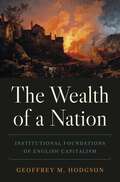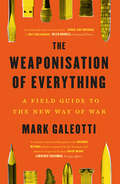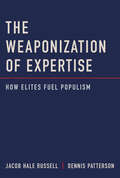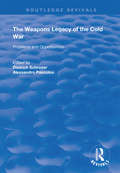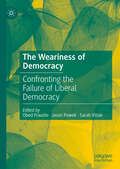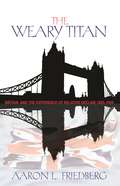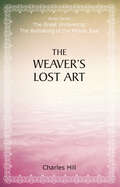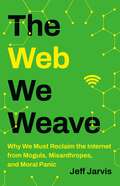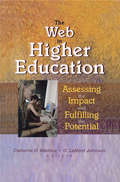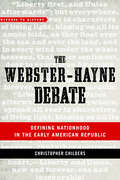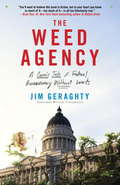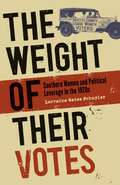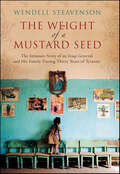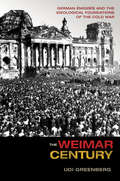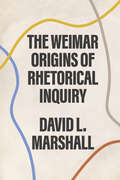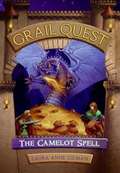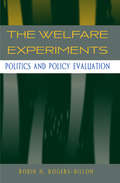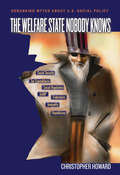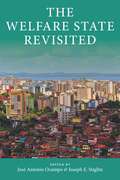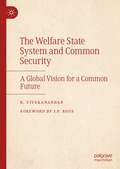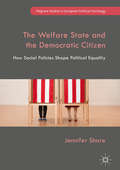- Table View
- List View
The Wealth of a Nation: Institutional Foundations of English Capitalism (The\princeton Economic History Of The Western World Ser. #122)
by Geoffrey M. HodgsonHow the development of legal and financial institutions transformed Britain into the world’s first capitalist countryModern capitalism emerged in England in the eighteenth century and ushered in the Industrial Revolution, though scholars have long debated why. Some attribute the causes to technological change while others point to the Protestant ethic, liberal ideas, and cultural change. The Wealth of a Nation reveals the crucial developments in legal and financial institutions in the seventeenth and eighteenth centuries that help to explain this dramatic transformation.Offering new perspectives on the early history of capitalism, Geoffrey Hodgson describes how, for the emerging British economy, pressures from without were as important as evolution from within. He shows how intensive military conflicts overseas forced the state to undertake major financial, administrative, legal, and political reforms. The resulting institutional changes not only bolstered the British war machine—they fostered the Industrial Revolution. Hodgson traces how Britain’s war capitalism led to an expansion of its empire and a staggering increase in the slave trade, and how the institutional innovations that radically transformed the British economy were copied and adapted by countries around the world.A landmark work of scholarship, The Wealth of a Nation sheds light on how external factors such as war gave rise to institutional arrangements that facilitated finance, banking, and investment, and offers a conceptual framework for further research into the origins and consolidation of capitalism in England.
The Weaponisation of Everything: A Field Guide to the New Way of War
by Mark GaleottiAn engaging guide to the various ways in which war is now waged—and how to adapt to this new reality Hybrid War, Grey Zone Warfare, Unrestricted War: today, traditional conflict—fought with guns, bombs, and drones—has become too expensive to wage, too unpopular at home, and too difficult to manage. In an age when America threatens Europe with sanctions, and when China spends billions buying influence abroad, the world is heading for a new era of permanent low-level conflict, often unnoticed, undeclared, and unending. Transnational crime expert Mark Galeotti provides a comprehensive and ground-breaking survey of the new way of war. Ranging across the globe, Galeotti shows how today&’s conflicts are fought with everything from disinformation and espionage to crime and subversion, leading to instability within countries and a legitimacy crisis across the globe. But rather than suggest that we hope for a return to a bygone era of &“stable&” warfare, Galeotti details ways of surviving, adapting, and taking advantage of the opportunities presented by this new reality.
The Weaponization of Expertise: How Elites Fuel Populism
by Jacob Hale Russell Dennis PattersonThe problem with expertise—and the dark side of the equation &“knowledge = power.&”Experts are not infallible. Treating them as such has done us all a grave disservice and, as The Weaponization of Expertise makes painfully clear, given rise to the very populism that all-knowing experts and their elite coterie decry. Jacob Hale Russell and Dennis Patterson use the devastating example of the COVID-19 pandemic to illustrate their case, revealing how the hubris of all-too-human experts undermined—perhaps irreparably—public faith in elite policymaking. Paradoxically, by turning science into dogmatism, the overweening elite response has also proved deeply corrosive to expertise itself—in effect, doing exactly what elite policymakers accuse their critics of doing.A much-needed corrective to a dangerous blind faith in expertise, The Weaponization of Expertise identifies a cluster of pathologies that have enveloped many institutions meant to help referee expert knowledge, in particular a disavowal of the doubt, uncertainty, and counterarguments that are crucial to the accumulation of knowledge. At a time when trust in expertise and faith in institutions are most needed and most lacking, this work issues a stark reminder that a crisis of misinformation may well begin at the top.
The Weapons Legacy of the Cold War: Problems and Opportunities (Routledge Revivals)
by Alessandro Pascolini Dietrich SchroeerFirst published in 1997, this volume builds its discussion on a technological base along with policy implications, and constitutes a review of the current situation in international security created by the Cold War, and how the end of the Cold War is likely to change the situation. As the close of the Cold War created a multitude of changes in international security, resulting in a broad range of topics tackled in this collection. It features specialists in military technology, physics, political science, public and international affairs.
The Weariness of Democracy: Confronting the Failure of Liberal Democracy
by Jason Powell Obed Frausto Sarah VitaleLiberal democracy today, having aligned itself with capitalism, is producing a generalized feeling of weariness and disillusionment with government among the citizenry of many countries. Because of a decades-long march of globalized capitalism, economic oligarchies have gained oppressive levels of political power, and as a result, the economic needs of many people around the world have been neglected. It then becomes essential to remember that our ability to change society emerges from our power to formulate different questions; or, in this case, alternative understandings of democracy. This book draws together a variety of alternative theories of democracies in a quest to expose readers to a selection of the most exciting and innovative new approaches to politics today. The consideration of these leading alternative conceptualizations of democracy is important, as it is now common to see xenophobic and racist rhetoric using the platform of liberal democracy to threaten ideas of plurality, diversity, equality, and economic justice. In looking at four different models of democracy (utopian democracy, radical democracy, republican democracy, and plural democracy) this book argues that encounters with alternate conceptualizations of democracy is necessary if citizens and scholars are going to understand the constellation of possibilities that exist for inclusive, plural, economically equal, and just societies.
The Weary Titan: Britain and the Experience of Relative Decline, 1895-1905
by Aaron L. FriedbergHow do statesmen become aware of unfavorable shifts in relative power, and how do they seek to respond to them? These are puzzles of considerable importance to theorists of international relations. As national decline has become an increasingly prominent theme in American political debate, these questions have also taken on an immediate, pressing significance. The Weary Titan is a penetrating study of a similar controversy in Britain at the turn of the twentieth century. Drawing on a wide variety of sources, Aaron Friedberg explains how England's rulers failed to understand and respond to the initial evidence of erosion in their country's industrial, financial, naval, and military power. The British example suggests that statesmen may be slow to recognize shifts in international position, in part because they rely heavily on simple but often distorting indicators of relative capabilities. In a new afterword, Friedberg examines current debates about whether America is in decline, arguing that American power will remain robust for some time to come.
The Weaver's Lost Art (The Great Unraveling: The Remaking of th)
by Charles HillLooking beneath the surface of strategy, policy, and daily operations, this book uses the analogy of weaving to review the United States' historical responsibility for maintaining international peace and security. Author Charles Hill shows why the United States must marshal all possible elements in the Middle East, and supporters from without, to defeat the enemies of order in the region—and why the U.S. must weave an actively engaged, omnidirectional involvement to support and interact with whatever faction, regime, sect, leader, or state that seeks to gain legitimacy as a good citizen in the established international system.
The Web We Weave: Why We Must Reclaim the Internet from Moguls, Misanthropes, and Moral Panic
by Jeff JarvisA bold defense of the internet, arguing attempts to fix and regulate it are often misguided —"essential reading for anyone who cares about the future of the internet" (Taylor Lorenz, author of Extremely Online) The internet stands accused of dividing us, spying on us, making us stupid, and addicting our children. In response, the press and panicked politicians seek greater regulation and control, which could ruin the web before we are finished building it. Jeff Jarvis is convinced we can have a saner conversation about the internet. Examining the web&’s past, present, and future, he shows that many of the problems the media lays at the internet&’s door are the result of our own failings. The internet did not make us hate; we brought our bias, bigotry, and prejudice with us online. That&’s why even well-intentioned regulation will fail to fix hate speech and misinformation and may instead imperil the freedom of speech the internet affords to all. Once we understand the internet for what it is—a human network—we can reclaim it from the nerds, pundits, and pols who are in charge now and turn our attention where it belongs: to fostering community, conversation, and creativity online. The Web We Weave offers an antidote to today&’s pessimism about the internet, outlining a bold vision for a world with a web that works for all of us.
The Web in Higher Education: Assessing the Impact and Fulfilling the Potential
by Cleborne D Maddux D Lamont JohnsonA contemporary look at the merger of technology and education!This timely collection of analytical essays provides provocative discourse on the role technology will play in education in the 21st century. In this book, an esteemed panel of educators, information specialists, program designers, and researchers discusses issues, trends, and problems in online technology and its potential to re-energize the educational system. The Web?s promise to provide unique opportunities for improved instruction is a given; how that promise can be fulfilled is the debate that fuels The Web in Higher Education.The Web in Higher Education offers detailed proposals for: designing Web-based programs designing online courses implementing Web-based course-management systems developing a community prototype for educators using the Web to enhance televised educationA thoughtful look at the role of online technology in education, this insightful book is essential for educators and administrators. The Web in Higher Education serves as a reference point for the merger of teaching and technology that will likely define the educational process in the 21st century.
The Webster-Hayne Debate: Defining Nationhood in the Early American Republic (Witness to History)
by Christopher ChildersA crucial senatorial debate on the question of the states’ relationship to the federal government.Two generations after the founding, Americans still disagreed on the nature of the Union. Was it a confederation of sovereign states or a nation headed by a central government? To South Carolina Senator Robert Y. Hayne and others of his mindset, only the vigilant protection of states’ rights could hold off an attack on the southern way of life, which was undergirded by slavery. Massachusetts Senator Daniel Webster, on the other hand, believed that the political and economic ascendancy of New England—and the nation—required a strong, activist national government. In The Webster-Hayne Debate, Christopher Childers focuses on the sharp dispute that engaged Webster and Hayne in January 1830. During Senate discussion of western land policy, Childers explains, the senators’ exchanges grew first earnest and then heated, finally landing on the question of union—its nature and its value in a federal republic. Childers argues that both Webster and Hayne, and the factions they represented, saw the West as key to the success of their political plans and sought to cultivate western support for their ideas.A short, accessible account of the conflict and the related issues it addressed, The Webster-Hayne Debate captures an important moment in the early republic. Ideal for use in college classrooms or for readers interested in American history, this book examines a pivotal moment and a critical problem in the history of US politics. It also shows how Americans grappled with the issues of nationalism, sectionalism, and the meaning of union itself—issues that still resonate today.
The Webster-Hayne Debate: Defining Nationhood in the Early American Republic (Witness to History)
by Christopher ChildersIn this illuminating history, a senatorial debate about states’ rights exemplifies the growing rift within pre-Civil War America. Two generations after the founding, Americans still disagreed on the nature of the Union. Was it a confederation of sovereign states or a nation headed by a central government? To South Carolina Senator Robert Y. Hayne, only the vigilant protection of states’ rights could hold off an attack on a southern way of life built on slavery. Meanwhile, Massachusetts Senator Daniel Webster believed that the political and economic ascendancy of New England—and the nation—required a strong, activist national government.In The Webster-Hayne Debate, historian Christopher Childers examines a sharp dispute in January 1830 that came to define the dilemma of America’s national identity. During Senate discussion of western land policy, the senators’ increasingly heated exchanges led to the question of union—its nature and its value in a federal republic. Childers argues that both Webster and Hayne, and the factions they represented, saw the West as key to the success of their political plans and sought to cultivate western support for their ideas. A short, accessible account of the conflict and the related issues it addressed, The Webster-Hayne Debate captures an important moment in the early republic.
The Weed Agency
by Jim GeraghtyThe spellbinding mock history of the Department of Agriculture's most secretive and vital agencyThe little-known USDA Agency of Invasive Species -- founded by President and humble peanut farmer Jimmy Carter -- would like to reassure you that they rank among the most effective and cost-efficient offices within the sprawling federal bureaucracy. For decades, under Administrative Director Adam Humphrey and his "strategic disengagement" approach, the Agency has epitomized vigilance against the clear and present danger of noxious weeds. Humphrey's record of triumphant inertia faces only two obstacles. The first is reality; the second is the loud critic who dares to question the magic behind the Agency's success: Nicholas Bader. Formerly known as President Reagan's "bloody right hand," Bader is on an obsessive quest to trim the fat from the federal budget. Full of oddball characters who shed light on the daily operations of Beltway minions, THE WEED AGENCY showcases a world in which federal budgets balloon every year, where a career can be built upon the skill of rationalizing astronomical expenses, and where the word 'accountability' sends roars of laughter through DC office buildings. That's life inside the federal Agency of Invasive Species... and it may sound suspiciously similar to your reality.
The Weed Whisperer: A Doonesbury Book (Doonesbury #36)
by G. B. Trudeau&“I don&’t read Doonesbury. He glorifies drugs.&” —Former White House Press Secretary Marlin Fitzwater Welcome to the age of pivots. Two centuries after the Founding Fathers signed off on happiness, Zonker Harris and nephew Zipper pull up stakes and head west in hot pursuit. The dream? Setting up a major grow facility outside Boulder, Colorado, and becoming bajillionaire producers of &“artisanal&” marijuana. For Zonk, it&’s the crowning reset of a career that&’s ranged from babysitting to waiting tables. For Walden-grad Zip, it&’s a way to confront $600,000 in student loans. Elsewhere in Free Agent America, newlyweds Alex and Toggle are struggling. Twins Eli and Danny show up during their mother&’s MIT graduation, but a bad economy dries up lab grants, compelling the newly minted PhD to seek employment as a barista. Meanwhile, eternally blocked writer Jeff Redfern struggles to keep the Red Rascal legend-in-his-own-mind franchise alive, while aging music icon Jimmy T. endures by adapting to his industry&’s new normal: &“I can make music on my schedule and release it directly to the fans.&” He&’s living in his car. G.B. Trudeau&’s Doonesbury is now in its fifth decade, and has chronicled American life through eight presidents, four generational cohorts, and innumerable paradigm shifts. His political sitcom Alpha House, starring John Goodman, is available on DVD and by streaming from Amazon Prime. For the record, Trudeau always inhaled back in the day. As President Obama once explained, &“That was the point.&”
The Weight of Their Votes
by Lorraine Gates SchuylerAfter the ratification of the Nineteenth Amendment in 1920, hundreds of thousands of southern women went to the polls for the first time. In The Weight of Their Votes Lorraine Gates Schuyler examines the consequences this had in states across the South. She shows that from polling places to the halls of state legislatures, women altered the political landscape in ways both symbolic and substantive. Schuyler challenges popular scholarly opinion that women failed to wield their ballots effectively in the 1920s, arguing instead that in state and local politics, women made the most of their votes.Schuyler explores get-out-the-vote campaigns staged by black and white women in the region and the response of white politicians to the sudden expansion of the electorate. Despite the cultural expectations of southern womanhood and the obstacles of poll taxes, literacy tests, and other suffrage restrictions, southern women took advantage of their voting power, Schuyler shows. Black women mobilized to challenge disfranchisement and seize their right to vote. White women lobbied state legislators for policy changes and threatened their representatives with political defeat if they failed to heed women's policy demands. Thus, even as southern Democrats remained in power, the social welfare policies and public spending priorities of southern states changed in the 1920s as a consequence of woman suffrage.
The Weight of a Mustard Seed: The Intimate Story of an Iraqi General and His Family During Thirty Years of Tyranny
by Wendell Steavenson“A masterly and elegantly told story that weaves together the Iraqi past and present.” —New York Times Book Review“A first-class investigation…that tells the reader more about the tensions of living close to power in Saddam’s dictatorship.”—Washington PostThe Weight of a Mustard Seed is an unprecedented and intimate account of Iraqi life under Saddam Hussein’s brutal regime, revealed through the tragic story of one of the dictator’s loyal generals. Journalist Wendell Steavenson writes thrilling nonfiction with a novelist’s flair, offering a new perspective on life inside a totalitarian regime that is as moving, compelling, and dramatic as The Kite Runner and The Bookseller of Kabul.
The Weimar Century
by Udi GreenbergThe Weimar Century reveals the origins of two dramatic events: Germany's post-World War II transformation from a racist dictatorship to a liberal democracy, and the ideological genesis of the Cold War. Blending intellectual, political, and international histories, Udi Greenberg shows that the foundations of Germany's reconstruction lay in the country's first democratic experiment, the Weimar Republic (1918-33). He traces the paths of five crucial German émigrés who participated in Weimar's intense political debates, spent the Nazi era in the United States, and then rebuilt Europe after a devastating war. Examining the unexpected stories of these diverse individuals--Protestant political thinker Carl J. Friedrich, Socialist theorist Ernst Fraenkel, Catholic publicist Waldemar Gurian, liberal lawyer Karl Loewenstein, and international relations theorist Hans Morgenthau--Greenberg uncovers the intellectual and political forces that forged Germany's democracy after dictatorship, war, and occupation. In restructuring German thought and politics, these émigrés also shaped the currents of the early Cold War. Having borne witness to Weimar's political clashes and violent upheavals, they called on democratic regimes to permanently mobilize their citizens and resources in global struggle against their Communist enemies. In the process, they gained entry to the highest levels of American power, serving as top-level advisors to American occupation authorities in Germany and Korea, consultants for the State Department in Latin America, and leaders in universities and philanthropic foundations across Europe and the United States. Their ideas became integral to American global hegemony.From interwar Germany to the dawn of the American century, The Weimar Century sheds light on the crucial ideas, individuals, and politics that made the trans-Atlantic postwar order.
The Weimar Origins of Rhetorical Inquiry
by David L. MarshallThe Weimar origins of political theory is a widespread and powerful narrative, but this singular focus leaves out another intellectual history that historian David L. Marshall works to reveal: the Weimar origins of rhetorical inquiry. Marshall focuses his attention on Martin Heidegger, Hannah Arendt, Walter Benjamin, and Aby Warburg, revealing how these influential thinkers inflected and transformed problems originally set out by Max Weber, Carl Schmitt, Theodor Adorno, Hans Baron, and Leo Strauss. He contends that we miss major opportunities if we do not attend to the rhetorical aspects of their thought, and his aim, in the end, is to lay out an intellectual history that can become a zone of theoretical experimentation in para-democratic times. Redescribing the Weimar origins of political theory in terms of rhetorical inquiry, Marshall provides fresh readings of pivotal thinkers and argues that the vision of rhetorical inquiry that they open up allows for new ways of imagining political communities today.
The Weirdstone of Brisingamen
by Alan GarnerThe Weirdstone of Brisingamen is a 220 page fantasy novel written by the widely acclaimed author Alan Garner and first published in 1960. The Moon of Gomrath is its sequel. Alan Garner belongs to the distinguished line of children's fantasy writers that includes E Nesbit, J. R. R. Tolkien, C. S. Lewis, Lloyd Alexander, and Susan Cooper. The summary by William Collins Publishers reads as follows: In Fundindelve, the great dwarf-hall, legend says that a band of knights lie deep in enchanted slumber. They will not wake until the day when they must fight Nastrond, the spirit of evil. The magic which binds the sleeping knights is sealed in the heart of the Weirdstone of Brisingamen, and guarded by the good wizard Cadellin. When Susan and Colin, curious about this legend, venture into the gloomy woods near Alderley Edge, they are suddenly attacked and captured by the svart-alfar, strange goblin-like creatures, and then, in a flash of blue light, rescued by Cadellin. However, the good wizard has disturbing news: he has lost the Weirdstone!And if Nastrond finds it before Cadellin does, the world is doomed. But why did Nastrond send the svart-alfar to capture Susan and Colin? How are these modern-day children involved with the ancient magic? Not until they are safely home again does Susan realize that the jewel she wears on her wrist-the one her mother gave her long ago-is the missing Weirdstone. Trying to bring it back to Cadellin, she and Colin are soon caught up in a terrifying struggle between the forces of good and evil for possession of the stone. Alan Garner, winner of the Carnegie Medal and many other awards for his distinguished fiction for young readers, here draws on his deep knowledge of ancient folklore to create a world of sorcery, fantasy, and high adventure.
The Welfare Experiments
by Robin Rogers-DillonWelfare experiments conducted at the state level during the 1990s radically restructured the American welfare state and have played a critical--and unexpected--role in the broader policymaking process. Through these experiments, previously unpopular reform ideas, such as welfare time limits, gained wide and enthusiastic support. Ultimately, the institutional legacy of the old welfare system was broken, new ideas took hold, and the welfare experiments generated a new institutional channel in policymaking. In this book, Rogers-Dillon argues that these welfare experiments were not simply scientific experiments, as their supporters frequently contend, but a powerful political tool that created a framework within which few could argue successfully against the welfare policy changes. Legislation proposed in 2002 formalized this channel of policymaking, permitting the executive, as opposed to legislative, branches of federal and state governments to renegotiate social policies--an unprecedented change in American policymaking. This book provides unique insight into how social policy is made in the United States, and how that process is changing.
The Welfare Experiments: Politics and Policy Evaluation
by Robin H. Rogers-DillonWelfare experiments conducted at the state level during the 1990s radically restructured the American welfare state and have played a critical—and unexpected—role in the broader policymaking process. Through these experiments, previously unpopular reform ideas, such as welfare time limits, gained wide and enthusiastic support. Ultimately, the institutional legacy of the old welfare system was broken, new ideas took hold, and the welfare experiments generated a new institutional channel in policymaking. In this book, Rogers-Dillon argues that these welfare experiments were not simply scientific experiments, as their supporters frequently contend, but a powerful political tool that created a framework within which few could argue successfully against the welfare policy changes. Legislation proposed in 2002 formalized this channel of policymaking, permitting the executive, as opposed to legislative, branches of federal and state governments to renegotiate social policies—an unprecedented change in American policymaking. This book provides unique insight into how social policy is made in the United States, and how that process is changing.
The Welfare State Nobody Knows: Debunking Myths About U.S. Social Policy
by Christopher HowardThe Welfare State Nobody Knows challenges a number of myths and half-truths about U. S. social policy. The American welfare state is supposed to be a pale imitation of "true" welfare states in Europe and Canada. Christopher Howard argues that the American welfare state is in fact larger, more popular, and more dynamic than commonly believed. Nevertheless, poverty and inequality remain high, and this book helps explain why so much effort accomplishes so little. One important reason is that the United States is adept at creating social programs that benefit the middle and upper-middle classes, but less successful in creating programs for those who need the most help. This book is unusually broad in scope, analyzing the politics of social programs that are well known (such as Social Security and welfare) and less well known but still important (such as workers' compensation, home mortgage interest deduction, and the Americans with Disabilities Act). Although it emphasizes developments in recent decades, the book ranges across the entire twentieth century to identify patterns of policymaking. Methodologically, it weaves together quantitative and qualitative approaches in order to answer fundamental questions about the politics of U. S. social policy. Ambitious and timely, The Welfare State Nobody Knows asks us to rethink the influence of political parties, interest groups, public opinion, federalism, policy design, and race on the American welfare state.
The Welfare State Nobody Knows: Debunking Myths about U.S. Social Policy
by Christopher HowardThe Welfare State Nobody Knows challenges a number of myths and half-truths about U.S. social policy. The American welfare state is supposed to be a pale imitation of "true" welfare states in Europe and Canada. Christopher Howard argues that the American welfare state is in fact larger, more popular, and more dynamic than commonly believed. Nevertheless, poverty and inequality remain high, and this book helps explain why so much effort accomplishes so little. One important reason is that the United States is adept at creating social programs that benefit the middle and upper-middle classes, but less successful in creating programs for those who need the most help. This book is unusually broad in scope, analyzing the politics of social programs that are well known (such as Social Security and welfare) and less well known but still important (such as workers' compensation, home mortgage interest deduction, and the Americans with Disabilities Act). Although it emphasizes developments in recent decades, the book ranges across the entire twentieth century to identify patterns of policymaking. Methodologically, it weaves together quantitative and qualitative approaches in order to answer fundamental questions about the politics of U.S. social policy. Ambitious and timely, The Welfare State Nobody Knows asks us to rethink the influence of political parties, interest groups, public opinion, federalism, policy design, and race on the American welfare state.
The Welfare State Revisited (Initiative for Policy Dialogue at Columbia: Challenges in Development and Globalization)
by Joseph E. Stiglitz José Antonio OcampoThe welfare state has been under attack for decades, but now more than ever there is a need for strong social protection systems—the best tools we have to combat inequality, support social justice, and even improve economic performance. In this book, José Antonio Ocampo and Joseph E. Stiglitz bring together distinguished contributors to examine the global variations of social programs and make the case for a redesigned twenty-first-century welfare state.The Welfare State Revisited takes on major debates about social well-being, considering the merits of universal versus targeted policies; responses to market failures; integrating welfare and economic development; and how welfare states around the world have changed since the neoliberal turn. Contributors offer prescriptions for how to respond to the demands generated by demographic changes, the changing role of the family, new features of labor markets, the challenges of aging societies, and technological change. They consider how strengthening or weakening social protection programs affects inequality, suggesting ways to facilitate the spread of effective welfare states throughout the world, especially in developing countries. Presenting new insights into the functions the welfare state can fulfill and how to design a more efficient and more equitable system, The Welfare State Revisited is essential reading on the most discussed issues in social welfare today.
The Welfare State System and Common Security: A Global Vision for a Common Future
by B. VivekanandanThis book argues that the welfare state system should be adopted globally, not only for the purpose of achieving equality and justice within nations, but also for security between states. Using Finland, Sweden and Canada as case studies, it theorises that the welfare state system and the common security system, which are mutually reinforcing peace structures, should be utilised worldwide as the best method of attaining peace and prosperity. It demonstrates the feasibility of the welfare state in the past, whilst also showing how these historical experiences can be translated into socio-political action to address contemporary global challenges. Operating in the fields of political theory, international relations, and social philosophy, it will appeal to scholars and students of public policy, the welfare state, and sociology, as well as state policymakers.
The Welfare State and the Democratic Citizen: How Social Policies Shape Political Equality (Palgrave Studies in European Political Sociology)
by Jennifer ShoreThis book examines the ways in which the welfare state impacts levels and distributions of political participation and democratic support in Western democracies. Going beyond the traditional contextual accounts of political behaviour, which primarily focus on political institutions or the socio-economic climate, this book looks specifically at the impact of public policy on a variety of political behaviours and attitudes. Drawing on the theoretical insights from the policy feedback approach, the author argues and empirically demonstrates that generous social policy offerings can not only foster democratic citizenship by promoting a more inclusive political culture, but are most beneficial to citizens who are otherwise excluded from political life in many other societies. This book will appeal most to scholars in the fields of political science and sociology who are especially interested in the welfare state, public policy, political sociology, and inequality.
